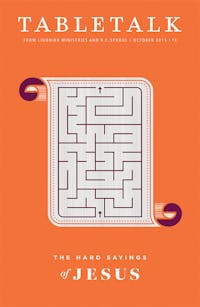
Request your free, three-month trial to Tabletalk magazine. You’ll receive the print issue monthly and gain immediate digital access to decades of archives. This trial is risk-free. No credit card required.
Try Tabletalk NowAlready receive Tabletalk magazine every month?
Verify your email address to gain unlimited access.
For many Christians, mentioning the “keys of the kingdom” calls to mind the extravagant claims of the Roman Catholic Church for the papacy. Protestants justifiably shrink from such claims. In Matthew 16:19, Jesus is addressing Peter, but He is not addressing only Peter:
I will give you the keys of the kingdom of heaven, and whatever you bind on earth shall be bound in heaven, and whatever you loose on earth shall be loosed in heaven.
After asking His disciples at Caesarea Philippi, “Who do people say that the Son of Man is?” (v. 13), Jesus then asks, “But who do you say that I am?” (v. 15). The Greek word translated “you” is plural. When Peter answers (v. 16), the context suggests he is answering for all the disciples. Jesus’ words in vv. 18–19 therefore represent the belief of all the disciples. Furthermore, Peter is commended in view of the confession that he makes of Jesus (v. 16). When Jesus promises to build His church on this “rock,” He has in view the twelve disciples’ making confession of Jesus as the Messiah. We are worlds away from the Roman pontiff. The twelve disciples are eyewitnesses to Jesus and confess that He is the long-awaited Messiah. This new covenant revelation will constitute, along with old covenant revelation, the foundation of the church. It is in this sense that the Apostles, by whom Jesus will proclaim this new covenant revelation, will form the church’s foundation (see John 14:26–27; Eph. 2:20).
What of the “keys”? In Matthew 16:19, the “binding” and “loosing” of the “keys” has as its background the administrative authority of the household steward. The Apostles, by the teaching that Jesus has entrusted to them, will order and administer the affairs of the church. In v. 18, the “binding” and “loosing” refers to the discipline of the church. We are to regard the church’s disciplinary decisions as the decisions of heaven. However, it is only when the church’s discipline is in accordance with the revealed will of Christ in Scripture that Christ owns that discipline. It is by the teaching and order that Jesus has given us in His Word that He presides over His beloved church. And that is good news indeed.
